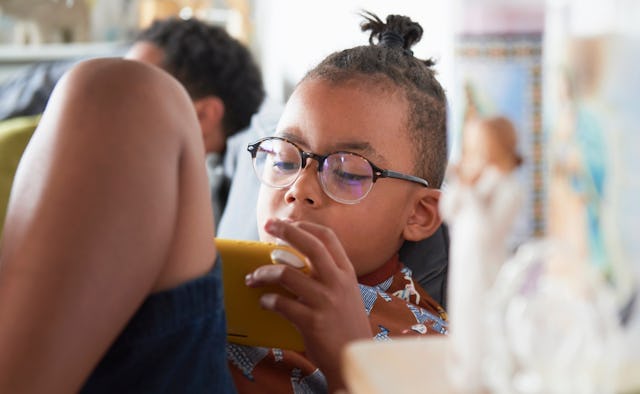Should My Kid Be Wearing Blue-Light Glasses During Screen Time?
Blue-light glasses are everywhere now, but their benefits are up for debate.

One of my kids wears eyeglasses, and the other does not. Both are on screens for hours a day, between homework and gaming and shows. I am, too, thanks to my work, and once I sign out, I watch Netflix on my laptop. So, I have been aware of the hype around blue-light glasses for a while — I just never did any real research into them.
Then this summer, while browsing in a gift shop, I grabbed a pretty pair of reading glasses that are also blue-light filtering. I bought them on a whim, and they are now my favorite go-to readers. Maybe my eyes get a little less fatigued when I wear them, although eye fatigue is hard to quantify. And I am a suggestible person, so I don't know if their effect is legit or if I want to justify my snazzy not-drugstore readers.
Still, it makes you wonder: As much time as kids spend staring at screens today, should they be wearing blue-light glasses? It's time to dig a little deeper.
Blue Light and Sleep Don't Mix
It's only relatively recently that human beings have been staring at screens before bedtime. And as it turns out, bedtime is when blue light becomes potentially harmful only in that it might jog our brain awake. The worry is that screen stimulation, right when we should be getting ready for bed, gives our kids (not to mention us) poor sleep, which then leads to a host of other ills, from depression to diabetes.
It's important not to get too hysterical, though. Checking texts one last time before bed does not lead directly to health issues and anxiety. On the other hand, the iPhone has "wind down" settings for a reason, and the reason is that we should not be scrolling away when our head hits the pillow.
So first, before we talk about glasses, consider instituting a phone-down rule for yourself and your kids so that no one is staring at a screen right before bedtime.
Blue Light Probably Does Not Cause Eye Strain
Blue light can jog you awake, and you can find plenty of articles that link screentime to eye strain. But I am going to trust the American Academy of Ophthalmology (AAO), which says that blue light is not responsible for eye fatigue. Daniel Porter, patient education coordinator at the AAO, writes, "The reason we get digital eye strain is that we blink less when we stare at our devices. Normally, humans blink around 15 times per minute — but this 'blink rate' can be cut in half when staring at screens or doing other near-work activities (like reading)."
To lessen eye strain, ophthalmologists recommend taking a 20-second break from screens (or reading) every 20 minutes. We can also keep a screen arm's-length away and reduce the brightness and contrast coming from each screen.
The Question of Kids and Blue Light Glasses
With all of that said, do kids really need glasses that filter blue light? Nope. "I prefer to teach kids better habits instead of supplying them a crutch like blue light glasses to enable them to consume even more media," said K. David Epley, M.D., clinical spokesperson for the AAO. "If you run too far and your legs start hurting, you stop. Likewise, if you've been reading too long or watching videos until your eyes start hurting, you should stop."
Since there is no scientific evidence that blue light from digital devices causes damage to your eye, the AAO does not recommend special blue light-blocking eyeglasses for computer use. I still like my nice readers that filter blue light, but at least now I won't kid myself about big health benefits.
This article was originally published on